Onions are one of the most popular and versatile vegetables in the world. They can be eaten raw, sautéed, baked, grilled, stuffed, and pickled… or, if you’re old school like me, fried up with some crispy schmaltz to make gribenes. This humble, hearty vegetable moved Julia Child to say, “It’s hard to imagine a civilization without onions.” To be sure, our cooking would be significantly different if the onion did not exist. Onions are a vitally important part of our culinary history, and it seems only fitting to give them their very own post here on the Shiksa blog. From history to chopping to stopping the tears, let this post be your one-stop onion shop!
History
Onions are one of the most ancient food sources on the planet. It’s impossible to know exactly when they first popped up on the culinary scene; most historians agree that they have been domesticated and cultivated for at least 6000 years, possibly longer. They were likely a prehistoric dietary staple for our hunter-gatherer ancestors. Onions are mentioned on ancient Babylonian tablets in recipe form dating all the way back to 1700-1600 BCE. They’ve been used throughout history for a variety of purposes, primarily in cooking. Part of the onion’s popularity throughout the centuries is its versatility; it can be grown in a wide variety of climates and soils.
Ancient Egyptians believed onions symbolized eternity; they were placed on altars and buried with the Pharaohs. Excavated tombs have revealed mummies with onions placed on various parts of their bodies. Onions were used to feed the workers constructing the pyramids; they also appear on pyramid paintings. In Pompeii, remains of an onion basket were discovered in a brothel—apparently, back then they were thought to encourage “carnal desire.” Nowadays they seem to have the opposite effect (eww, onion breath?).
Onions have a long medicinal history. Ancient Roman naturalist Pliny the Elder believed that they healed sores, vision problems, toothaches, and dysentery. Gladiators were massaged with onion juice before walking into the arena, believing it promoted strength. In 6th century India, onions were deemed helpful for the heart, joints and indigestion. In Elizabethan times, onions were used to soothe blisters and hemorrhoids. Science has caught up with these antiquated beliefs, and we now know that some of these early medicinal theories were not far off base. Onions are proven to be high in Vitamin C and quercitin, an antioxidant flavonoid that may help to lower cholesterol and the risk of heart disease, as well as certain types of cancer.
The Smell
Onions have an unmistakable odor that can linger on your hands and fingers for days to come. To get rid of the scent, try rubbing them on a stainless steel spoon (mentioned in my first Helpful Kitchen Tips post). Or, for a slightly less frugal approach (and the cook who has everything), you can purchase a stainless steel “soap” bar. I have to admit that I bought one of these, and it’s really nice to have sitting on the kitchen sink. Stainless Steel Rub Away Bar
The Tears
Yes, that’s me, wearing my trusty pair of onion goggles. What, you thought I was one of those slick, flawlessly groomed Food Network peeps? Nope, I’m a homespun kitchen nerd all the way. And I do love my goggles!
It’s inevitable—when you slice a raw onion, your eyes will tear up. With my sensitive eyes, I need all the help I can get in this department. There are plenty of wives tales and folk remedies out there to stop the tearing. One suggests placing a chunk of bread between your teeth while performing your chopping and dicing (didn’t work for me). More practical tips include using a sharp knife to ensure a clean cut, placing exposed areas down against your cutting surface, and chilling your onion in the refrigerator for a few minutes before cutting (this last one actually helps a bit, but doesn’t solve it completely for me).
The only thing that really works for me is these onion goggles. While they may look a little silly, who cares? You won’t need waterproof mascara in the kitchen anymore. Here’s a link to the pair I use: Onion Goggles
Do you have any tips for combating onion tears? I’d love to hear any methods you’ve found to be helpful, please comment below and let me know! Meanwhile, here’s a quick tutorial on the proper way to easily chop and mince an onion.
Recommended Products:
We are a participant in the Amazon Services LLC Associates Program, an affiliate advertising program designed to provide a means for us to earn fees by linking to Amazon.com and affiliated sites. As an Amazon Associate I earn from qualifying purchases.
Ingredients
- Onion
- Chef's knife
- Cutting surface
Instructions
To Chop or Dice an Onion
- On the top of the onion, there will be a papery looking knob. On the bottom of the onion, you'll see a root end with little root threads hanging off. You'll want to keep the root end of the onion intact as you move forward, it will make chopping the onion easier.

- Slice off the papery top of the onion and discard.

- Slice the onion in half length-wise, slicing through the thready root knob to cut the onion into two equal halves.

- Start with one half of the onion. Lay the flat side down on your cutting board. Peel off the papery outer skin and any blemished outer layer to reveal a clean onion. Discard the skin and outer layers.

- With the flat side down, slice through the onion vertically several times, stopping just shy of the root end. The root will help hold your slices together, which will make dicing easier. Don't worry if a few edge pieces fall away from the root, no big deal- you can chop them later.

- Give the onion a quarter turn and slice thinly in the opposite direction to create your chopped, diced pieces.

- When the onion becomes too small to slice comfortably, turn it flat side down and continue chopping all the way to the knob.

- Discard the knob. Repeat the process for the remaining onion half.

To Mince an Onion:
- Some recipes call for a smaller dice, also known as a mince. Once you have finished dicing the onion as outlined above, you can easily mince it by running your knife through the diced onions, chopping them into even finer pieces. Think Martin Yan, Yan Can Cook style (anybody else remember watching him?? One of my favorite shows as a kid!). Chop chop chop! Continue chopping through the pile until you achieve the texture you desire.

Research Sources
Kiple, Kenneth F. & Ornelas, Kriemhild Conee (2000). The Cambridge World History of Food, Volume 1. Cambridge University Press.
Rupp, Rebecca (2011). How Carrots Won the Trojan War. Storey Publishing, North Adams, MA.
“Quercitin.” Medical Reference. University of Maryland Medical Center, n.d. Web. 06 May 2
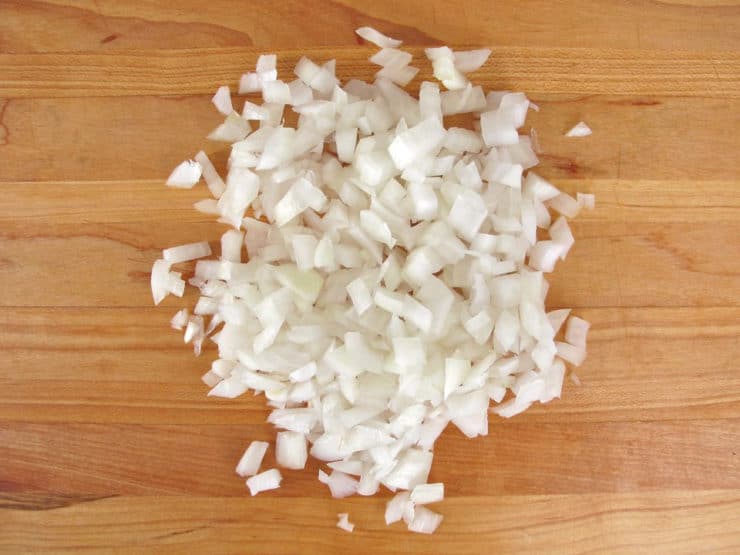
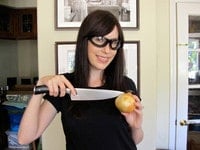
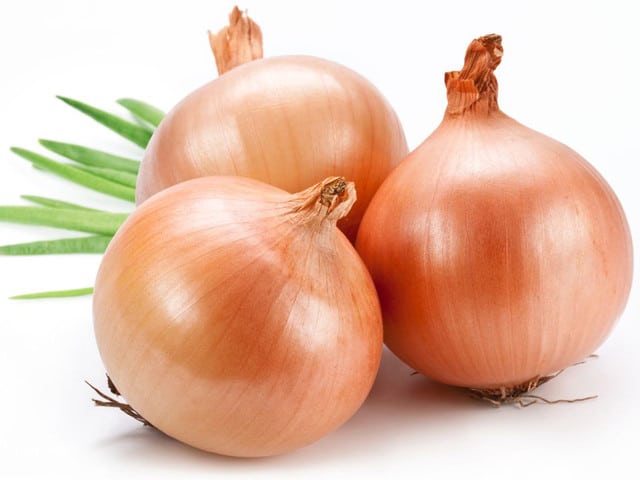
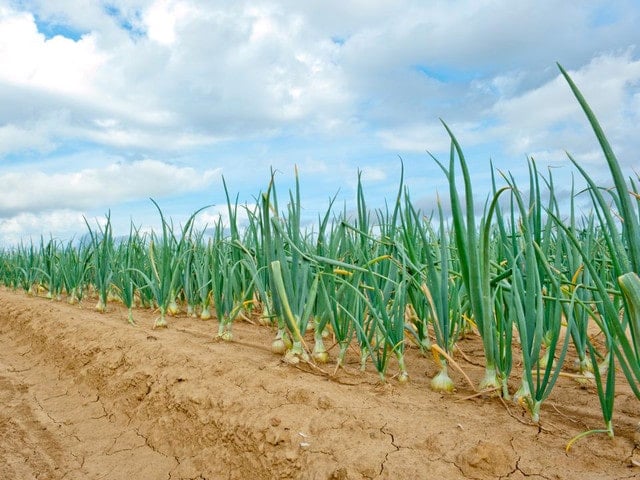
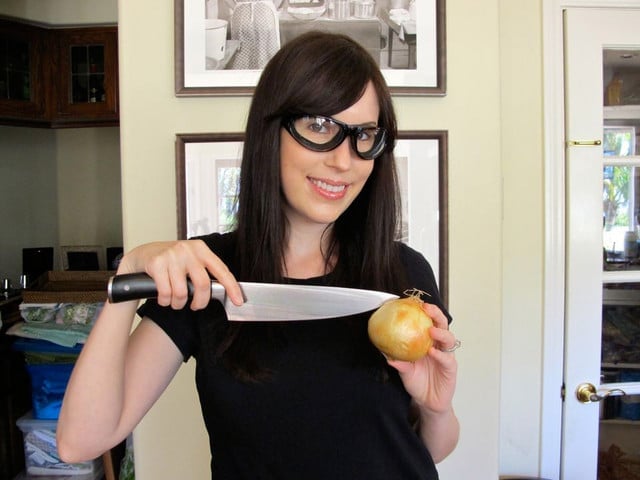
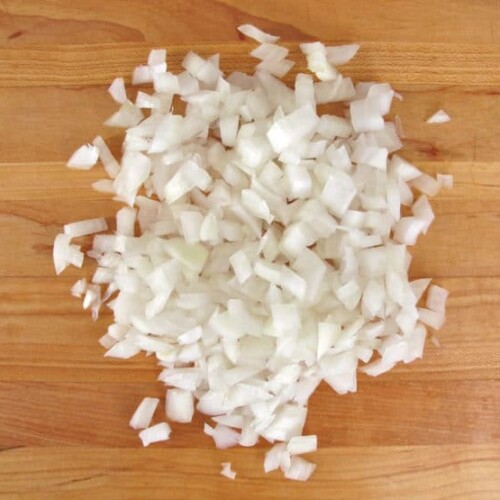

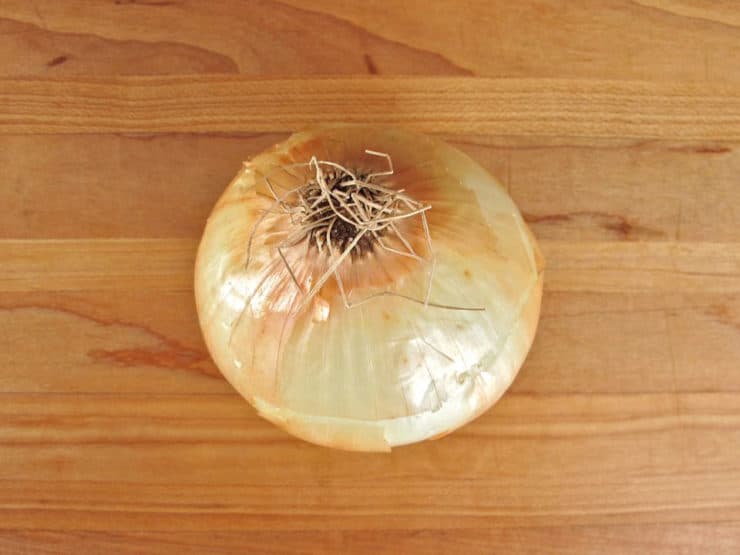
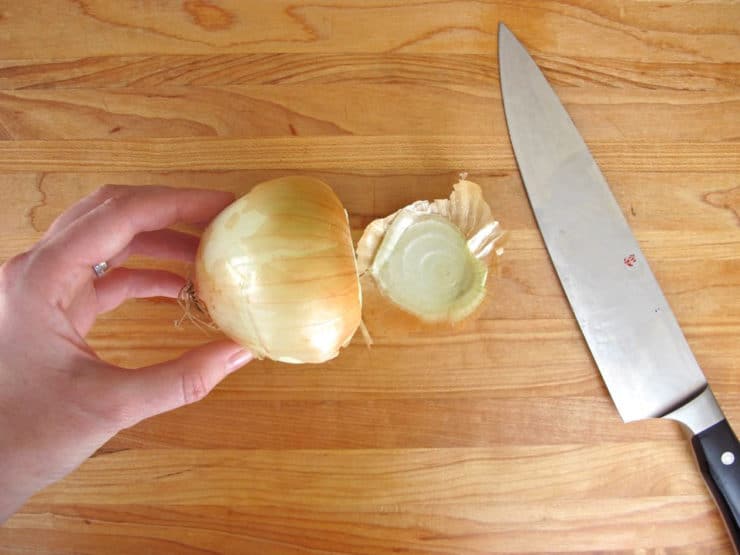
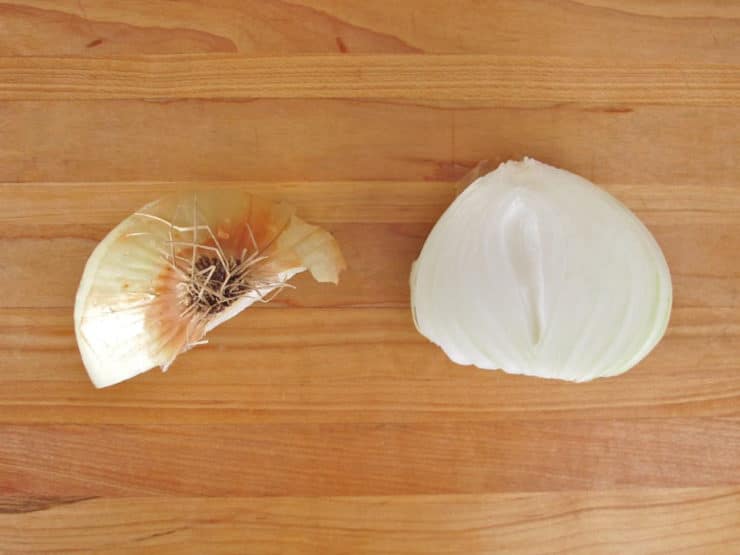
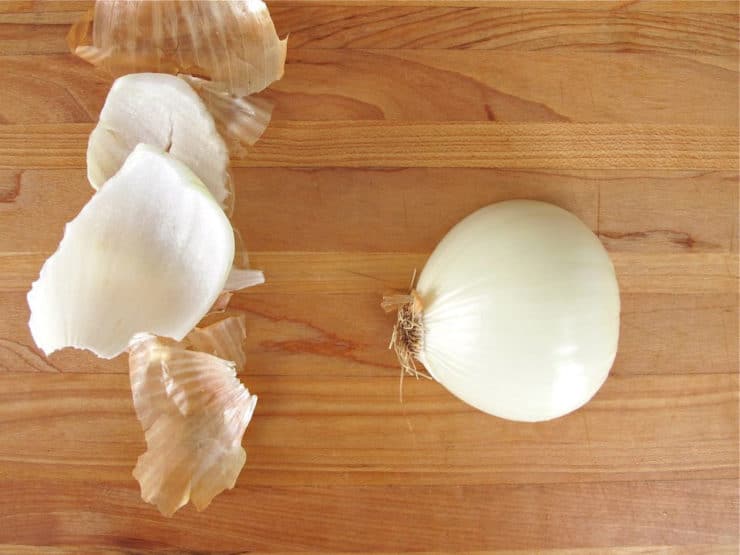
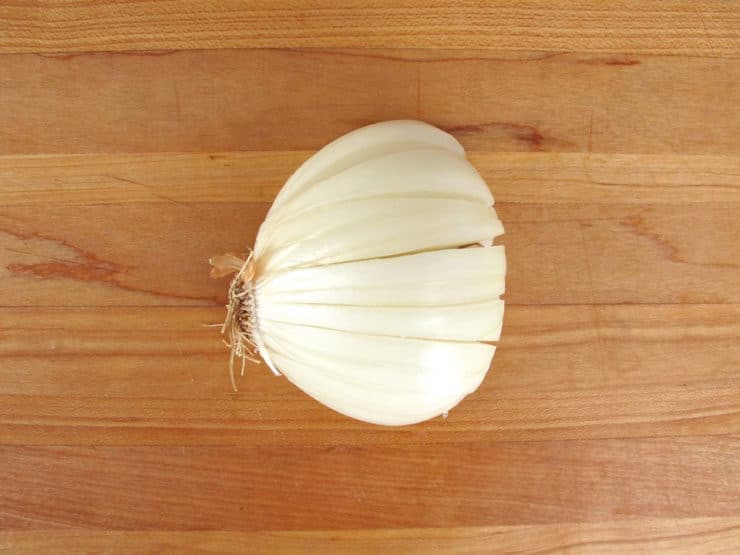
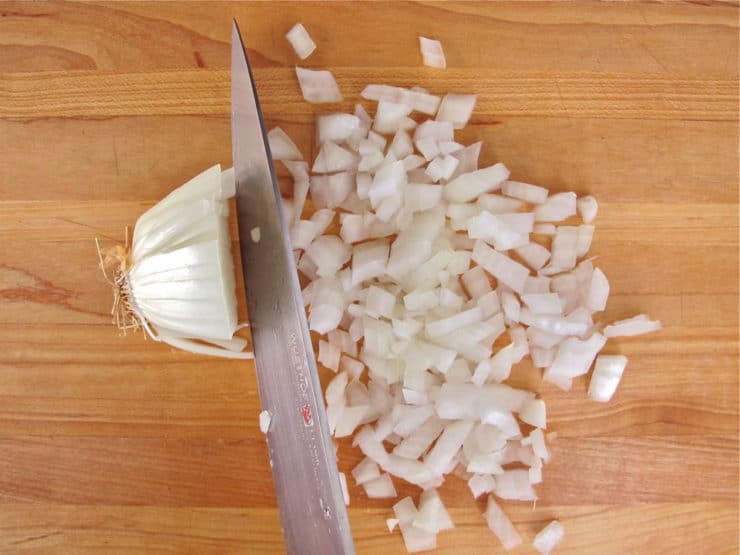
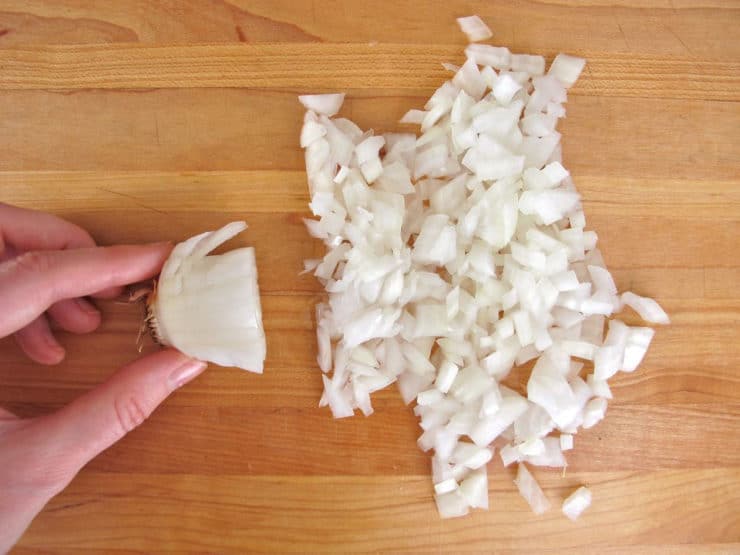
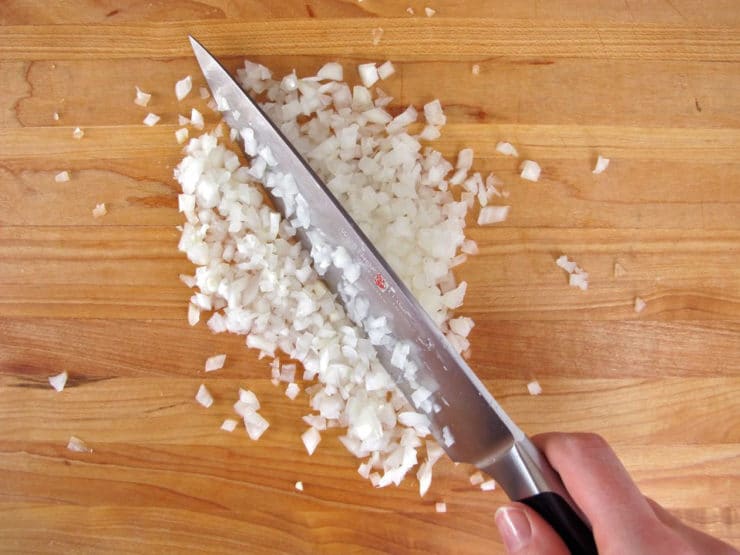


When I used to work in a restaurant, if the onions got you, you´d go in the walk-in freezer for a few seconds and it would cure it. If you don´t have a walk-in, it might look less strange to wear the googles than it does to start crying and stick your head in the freezer.
Catwoman!
Fire burns off the sulfuric acid which is what burns your eyes… why open flames work!
Hahahaha
Chop your onion next to an open flame, such as a lit element on your gas stove. Convection from the flame will draw in oxygen as fuel and subsequently any sulfenic acids being generated by chopping the onion. The sulfenic acids will combust in the flame instead of reacting with your eyes allowing you to go tear free!
Fabulous tip Michael, thanks for sharing the method as well as the science behind it!
I think I would rather tear up, LOL!
Um more like GORGEOUS Tori Avey! You´d be hard pressed to not look beautiful… <3
Did you know that if you stick your face in the freezer the cold air stops the watering and burning. Works everytime. Also if you don´t open your mouth and just breath from your nose you don´t tend to tear. I´m a chatty Cathy and I can´t keep my big mouth shut. lol
I have the same glasses in RED – love them!
Light a candle near your cutting board (but not too close!) Don´t know why, but it totally works.
Never heard that one before Nava! Great tip!
Wish I could do that, but I need my glasses to see and not chop off my fingers! LOL …besides, I have lots of facial neuropathy, so they would cause me other problems! UGH!!! LOL
Maybe one of these other tips can help. There are some good ones here!
Freeze the onions before cutting them. Totally works.
Contact lenses
Cute
love them! hate crying!
Burn a candle, while doing so to.When a candle is lit near the chopping board the gas that is emitted from the onions get drawn towards the flame of the burning candle or lamp and it does not reach your eyes
this is what my grandma use to say…
LOVE onions and garlic….food would not be food without them! 🙂
Fabulous!
nice goggles. looks like you´re going swimming after dinner lol
I´m nothing if not fashionable Mike! 😉
I keep my onions in the fridge. Helps keep the fumes down when they are chilled.
I do that one too Kathy, it does help a lot!